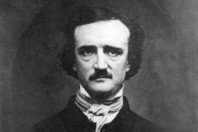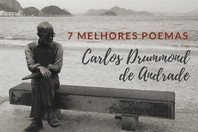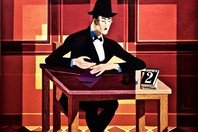Poemas de Edgar Allan Poe
Eu não tenho fé na perfeição humana. O homem é agora mais ativo, não mais feliz, ou mais esperto, do que era 6000 anos atrás.
"A contemplação da beleza, creio eu, proporciona o mais intenso, elevado e puro de todos os prazeres. Na verdade, quando se fala em beleza, não se está referindo exatamente a uma qualidade, como se supõe, e sim a um efeito - está se referindo, em suma, à intensa e pura elevação da alma, não do intelecto ou do coração - a qual mencionei e que pode ser extraída da contemplação do 'belo'."
Essas calamidades, nas dimensões que citei, impressionam vivamente a nossa fantasia, se acontecem longe e atingem a muitos. A verdadeira infelicidade – o supremo infortúnio – é, na verdade, particular. É o sofrimento bem perto. De um só conhecido. Os extremos medonhos da agonia são sofridos pelo homem isoladamente, e nunca pelo homem na multidão.
Anabel Lee
It was many and many a year ago,
In a kingdom by the sea,
That a maiden there lived whom you may know
By the name of Annabel Lee;
And this maiden she lived with no other thought
Than to love and be loved by me.
I was a child and she was a child,
In this kingdom by the sea;
But we loved with a love that was more than love-
I and my Annabel Lee;
With a love that the winged seraphs of heaven
Coveted her and me.
And this was the reason that, long ago,
In this kingdom by the sea,
A wind blew out of a cloud, chilling
My beautiful Annabel Lee;
So that her highborn kinsman came
And bore her away from me,
To shut her up in a sepulchre
In this kingdom by the sea.
The angels, not half so happy in heaven,
Went envying her and me-
Yes!- that was the reason (as all men know,
In this kingdom by the sea)
That the wind came out of the cloud by night,
Chilling and killing my Annabel Lee.
But our love it was stronger by far than the love
Of those who were older than we-
Of many far wiser than we-
And neither the angels in heaven above,
Nor the demons down under the sea,
Can ever dissever my soul from the soul
Of the beautiful Annabel Lee.
For the moon never beams without bringing me dreams
Of the beautiful Annabel Lee;
And the stars never rise but I feel the bright eyes
Of the beautiful Annabel Lee;
And so, all the night-tide, I lie down by the side
Of my darling- my darling- my life and my bride,
In the sepulchre there by the sea,
In her tomb by the sounding sea.
No entanto, o corvo solitário
Não teve outro vocabulário,
Como se essa palavra escassa que ali disse
Toda a sua alma resumisse.
Nenhuma outra proferiu, nenhuma,
Não chegou a mexer uma só pluma,
Até que eu murmurei: "Perdi outrora
Tantos amigos tão leais!
Perderei também este em regressando a aurora."
E o corvo disse: "Nunca mais!"
Estremeço. A resposta ouvida
É tão exata! é tão cabida!
"Certamente, digo eu, essa é toda a ciência
Que ele trouxe da convivência
De algum mestre infeliz e acabrunhado
Que o implacável destino há castigado
Tão tenaz, tão sem pausa, nem fadiga,
Que dos seus cantos usuais
Só lhe ficou, na amarga e última cantiga,
Esse estribilho: "Nunca mais".
Segunda vez, nesse momento,
Sorriu-me o triste pensamento;
Vou sentar-me defronte ao corvo magro e rudo;
E mergulhando no veludo
Da poltrona que eu mesmo ali trouxera
Achar procuro a lúgubre quimera,
A alma, o sentido, o pávido segredo
Daquelas sílabas fatais,
Entender o que quis dizer a ave do medo
Grasnando a frase: "Nunca mais".
Se hoje você queima livros do Paulo Coelho, amanhã queimará também de Edgar Allan Poe, Álvares de Azevedo, Florbela Espanca, Clarice Lispector e muitos outros. Queimar livros de um escritor porque em um minuto de inépcia ele escreveu algo, você desmostra mais asnice do que ele.
Ah, foi rompida a taça dourada! Teu espírito escapou eternamente! Que dobre o sino! Uma santa alma já cruza o rio Estígio! E tu, Guy de Vere, não vertes lágrimas? Chores agora ou nunca mais!
Veja, no terrível esquife jaz teu amor, Lenora! Leiam-se os ritos funerários e o canto derradeiro, Um hino à mais nobre rainha, a mais jovem a partir, Que duplamente morreu, ainda tão jovem ao sumir.





